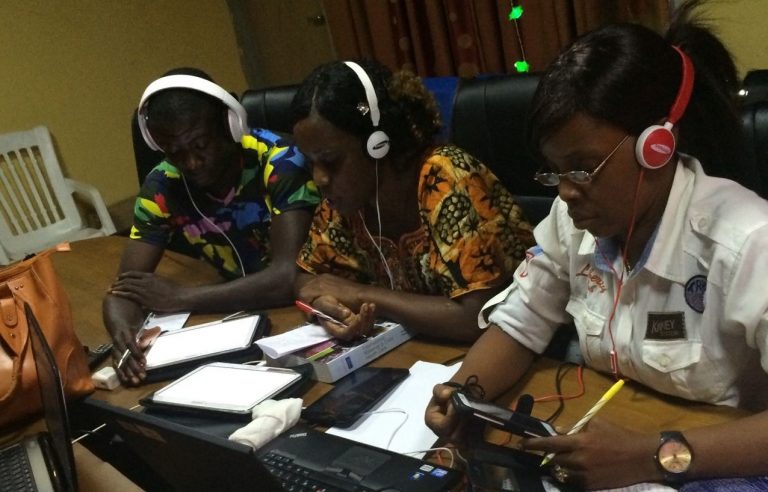The context
Liberia has the lowest doctor/patient ratio in the world, with just 1 doctor for 71,000 people (in the UK the ratio is 1 per 360). A partnership between the Liberian Ministry of Health, WHO Liberia, UNFPA Liberia, and MCAI (Maternal and Childhealth Advocacy International) is managing an innovative task-sharing project that trains carefully selected, experienced midwives in advanced obstetrics, including abdominal surgery.
Midwives are the focus of this training because they are the main skilled birth attendants in Liberia and already have basic baseline knowledge of obstetrics. But as the government grapples with challenges like adequacy of workforce, improvement in education and geographic access, the question that matters is whether these midwives have the skills and preparation to perform their tasks and reduce maternal mortality. So the goal of this pilot has been to empower the midwives with more skills and knowledge to enable them do their usual jobs more competently and effectively.
The training program
For the training to succeed each of the three training hospitals (C.B. Dunbar Maternity Hospital in Gbarnga, C.H. Rennie Hospital in Kakata, and Redemption Hospital in Monrovia) must have an adequately equipped maternity unit. MCAI thus provided a large quantity of essential equipment such as portable ultrasound scanners; essential surgical instruments; drugs; and medical, anaesthetic and surgical supplies.
The approved curricula for this apprenticeship-based training in advanced obstetrics – developed by MCAI with WHO input – includes practical and academic components. The trainees have one day per week of classroom-based training, including a two-hour interactive, distance learning session from UK-based experts.[2] Examinations are given weekly and the trainees review their results during the tutorials in the following week. Trainees also record each intervention with a patient (including outcomes) in an electronic database and a paper logbook.
Trainees work in a team alongside doctors and undertake on-call commitments. Currently they are treating (under supervision) most of the major medical problems in obstetric patients such as severe pre-eclampsia, major haemorrhage and sepsis. They are also treating (under a variable level of supervision depending on their skill attainment) a large proportion of the surgical procedures such as caesarean section and laparotomy for ruptured ectopic pregnancies.
The pilot began in October 2013, with two midwives, who successfully completed their three years of training in October 2016. By this stage they had undertaken many hundreds of major medical and surgical procedures (table). [1] Following a final examination by the LMDC (Liberia Medical and Dental Council) in October 2016, both passed and have received licenses to practice in public hospitals designated by the MOH. They are now awaiting deployment by the MOH to suitable rural hospitals.
| Major procedures or conditions managed by midwife-trainees during three years of training | Number of patients |
| Caesarean section | 473 |
| Manual removal placenta | 32 |
| Vaginal breech delivery | 31 |
| Vacuum delivery | 21 |
| Repair ruptured uterus | 12 |
| Eclampsia or severe preeclampsia | 80 |
| Severe post-partum haemorrhage | 44 |
| Shock | 28 |
| Miscarriage | 58 |
| Ruptured ectopic pregnancy | 7 |
| Emergency hysterectomy | 3 |
In October 2015, nine more trainees began a similar three-year training program. They will complete classwork by the end of October 2017 and will work during the third and final year as interns before qualifying as obstetric clinicians in October 2018. A third group of six trainees will begin coursework in November 2017.
Results and preliminary conclusions
What has evolved so far is a strong teamwork between the physicians manning the obstetric units and the trainees.
The doctors see the midwives as an integral part of the clinical team and involve them in all aspects of clinical management. This translates into better care for pregnant women.
While it may be prudent to train the obstetric clinicians in relevant surgical interventions, the surgery aspect of the training is not necessarily the most important. The midwives are first and foremost trained to be better midwives and not “mini-doctors.” Moreover, the great majority of obstetric hospital care is medical rather than surgical. This is why they are called obstetric clinicians rather than midwife-surgeons.
At all three training hospitals, the evidence is that the midwives automatically become the clinical managers of the labor and delivery units and serve as the linkage between their general midwife colleagues and the doctors. They perform all manner of advanced procedures such as Caesarean section, but also including doing and supervising normal deliveries.
The usual approach has been that midwives receive ill patients and wait for doctors to come and treat. But in this model, the midwife-trainees are the front-liners who receive emergencies and immediately begin crucial therapeutic interventions before doctors (if they are needed) arrive.
More lives are saved this way and more complications mitigated. Thus the term “task-sharing” rather than “task shifting” appears to be appropriate.
References
- Obed Dolo, Alice Clack, Hannah Gibson, Naomi Lewis, David P Southall Training of midwives in advanced obstetrics in Liberia. Bulletin of the World Health Organization; Type: Lessons from the field. Article ID: BLT.160473 Published online: 25 February 2016 and subsequently in print.
- Southall DP, MacDonald R. Training Liberia’s Next Generation of Obstetric Clinicians through Interactive Distance Learning
Featured image: three of the trainee obstetric clinicians undergoing a tutorial via distance learning from MCAI’s base in Scotland.
Blog by David P Southall and Obed K Dolo.
 Professor David Southall, Honorary Medical Director, MCAI
Professor David Southall, Honorary Medical Director, MCAI
 Dr. Obed Dolo, Consultant Obstetrician CB Dunbar Hospital and Master Trainer MCAI
Dr. Obed Dolo, Consultant Obstetrician CB Dunbar Hospital and Master Trainer MCAI
